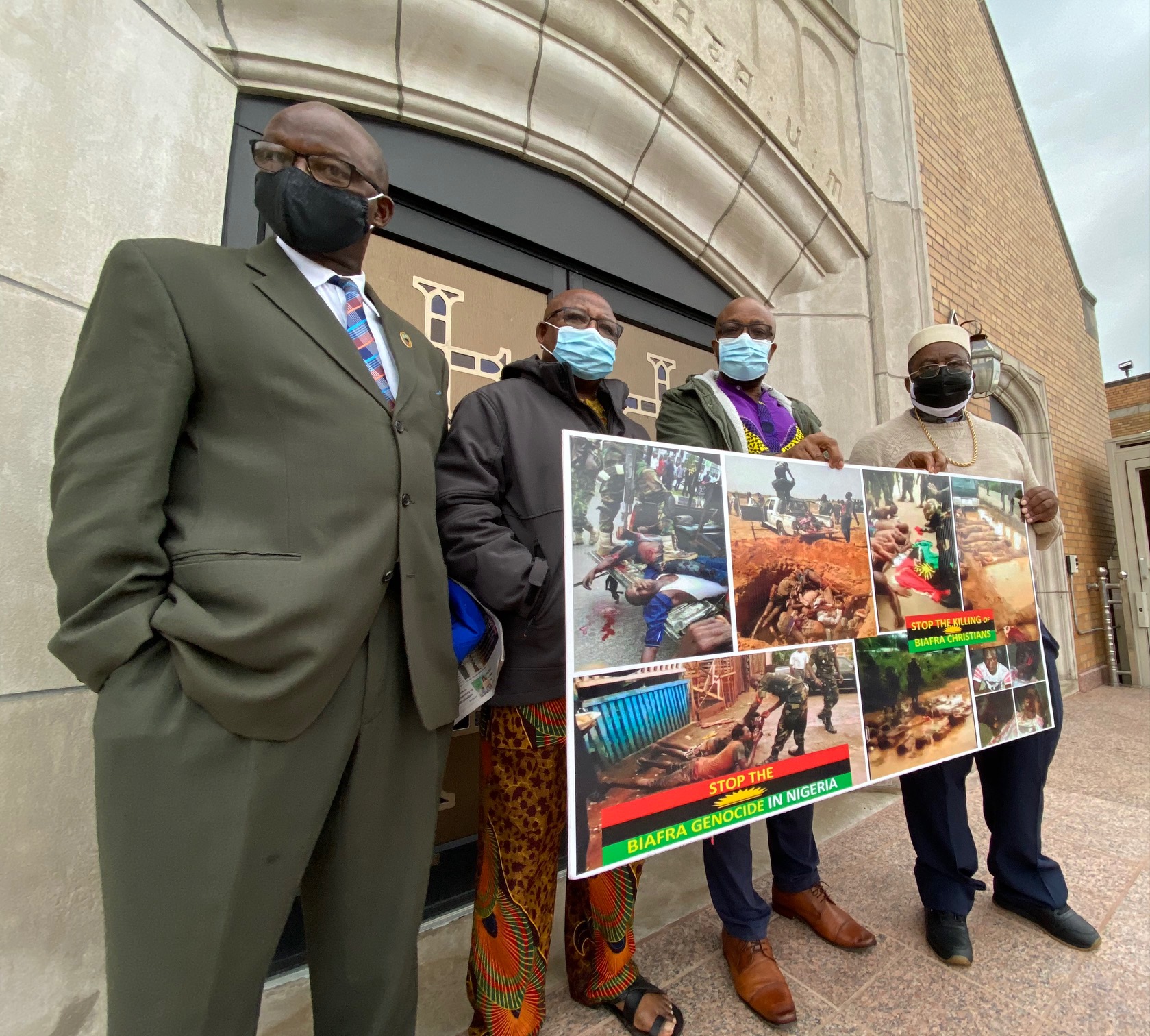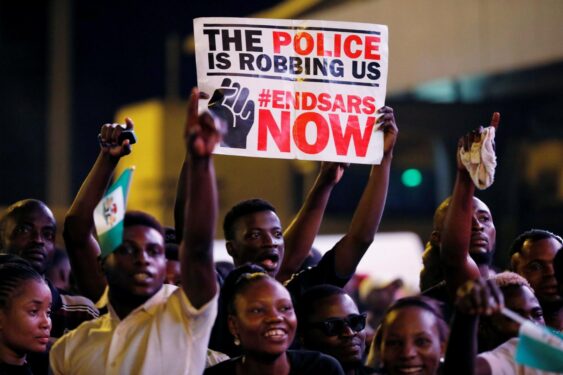EAST NEW YORK — Four men of the Nigerian Igbo community at St. Fortunata parish speculated what the violent conditions in their homeland would look like.
Imagine, challenged Chibuzo Nweke, that a gunman appears suddenly and sprays the congregants with bullets.
“They’re killing Christians,” Nweke said of the attackers from northern Nigeria. “They are bombing churches just like this. They would set this ablaze.”
Nweke, vice chairman of the Nigerian Community in St. Fortunata, said 70 percent of Nigerian Christians are Catholic. Still, attackers also target Anglicans, members of the Assemblies of God Fellowship, and Baptists. He said victims aren’t only fellow members of the Igbo group; others belong to the Yoruba culture.
“And,” added Evans Anuforoh, “as I am speaking to you right now, it is going on.”
Nweke and Anuforoh met with The Tablet at their Brooklyn parish after Mass on Nov. 15. Fellow parishioners Chuks Okolo and Uchenna Konkwo joined the conversation.
Ignoring Persecutions
Two weeks earlier, the newspaper interviewed Father Cosmas Nzeabalu and Sister Elizabeth Ogbu, both assigned to the Diocese of Brooklyn. They accused the Nigerian government of ignoring the persecutions of Christians in their homeland.

The four men complained the thuggery is perpetrated, in part, by Fulani Muslim cattle herders against Christian farmers in the agricultural lands of the nation’s contested “Middle Belt.”
All agreed that President Muhammadu Buhari, himself a Fulani, gives a pass to the herders. However, they added the government also gets the blame for recent bloody military crackdowns against police brutality protesters.
For example, the Nigerian Armed Forces on Oct. 20 reportedly opened fire on demonstrators at the Lekki Toll Gate in the southern seaport of Legos, the nation’s most populated city. Twelve people died at the toll gate and a nearby location. The human rights watch group Amnesty International investigated the violence and dubbed it the “Lekki Toll Gate Massacre.” The organization also accused officials of a coverup.
The government has promised police reforms, but the four parishioners at St. Fortunata expressed skepticism. They believe the police, military, government officials, and the herdsmen are puppets in an orchestrated effort by President Buhari, a former army general, to convert the entire nation to Islam.
“They have the power of the gun,” Nweke said. “They control the army; they control the police. So that is why they do these things and get off scot-free. They want to make sure all of us are going to become Muslim, but it’s never going to happen.”
Okolo said people in the mostly Christian South want to improve the economy by leveraging its vast natural resources, especially the region’s prolific oilfields. But, he said, government officials restrict development to control the populace.
“They won’t allow you to develop at your own pace,” Okolo said. “We have the capabilities, we have the knowledge, and we have the education to develop our area, but we are not being allowed to do that. We want to have our own government.”
Anuforoh further explained that as a result “of the inequalities in Nigeria, and because of the killings of Christians, in the eastern part of Nigeria, called Biafra, the people want to get out because Nigeria is a failed state.”
Biafra’s secession from Nigeria is a concept tried before, but with violent consequences.
After gaining its independence from Great Britain, Nigerians engaged in a civil war from 1967-1970, with the Igbo people and other groups working toward independent Biafra.
The Nigerian national government forced a blockade of Biafra. Hundreds of thousands and perhaps millions, mostly children, died of starvation.
The exact death toll has flummoxed historians for decades because some reports jumbled the numbers of wartime deaths that happened before the conflict began. A 2015 study by the World Peace Foundation at Tufts University said a true estimate may never be known. The available data suggests at least 50,000 died, but the number could be as high as 2 to 6 million.
After three years of fighting, the government regained control of the breakaway region.
Konkwo said the new proponents of an independent Biafra “want to secede through a peaceful means.”
“We want to hold a referendum (vote),” he explained. “And because of that, they are targeting us for daring to ask for a referendum. But we are not carrying arms; we’re not killing anyone.”
Pope Francis is aware of Nigeria’s recent turmoil. He offered a prayer for the nation after his Aug. 15 Angelus on the solemnity of the Assumption of the Blessed Virgin Mary. He mentioned Nigeria again after his Oct. 25 Angelus, this time explicitly addressing police brutality.
The four parishioners said that is a start, but they hope Pope Francis will have much more to say about Nigeria.
“We just want to bring these atrocities to the attention of the international community and especially to the Catholic leadership because 70 percent of the Christians are Catholic,” Konkwo said.
Cardinal Timothy Dolan, Archdiocese of New York, weighed in Monday, Nov. 16, with a brief video posted on Twitter.
“I’m especially worried about the persecution of Christians around the world,” he said, “and it has just been brought to my attention that it has been going on for a while now, I’m afraid, in Nigeria.”
“We got to love them,” Dolan said of the persecuted there. “We can’t let them suffer in silence. We got to advocate for them and support them. So keep in mind the Church in Nigeria, will you? We got so many great people and priests and sisters from Nigeria. We really need to go to bat for them.”

